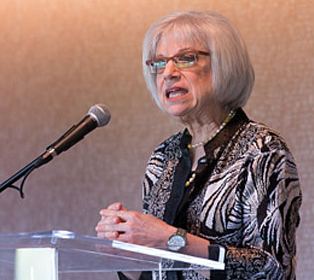
Rosalyn Richman addresses the ELAM Class of 2014 at the May 1 graduation ceremony.
Here you are — our 19th class — extending ELAM to some 825 women; enriching more than 200 medical, dental, and public health schools and other institutions; preparing to share your leadership knowledge and experiences with colleagues; considering how and where to BE a leader among leaders; pondering new options for yourself, and moving all women closer to equality and parity in the academic health workforce.
Each of you has a gift of leadership. Now what?
Know it! Use it! Share it! Value it! Replenish it!
Know It: When you first assembled, if you were like the previous 18 classes, you looked around and wondered what you were doing among this group of brilliant and accomplished women. In conversations with one another and with faculty, ELAM graduates, and others, you became more aware of your own particular strengths and skills — beyond your office or clinic or lab: your leadership niche.
Have you noticed the remarkable changes in your appearance and voice since you first came to ELAM last September? You stand taller, walk more assuredly, speak more mindfully by the spring session. You FEEL IT. You EMBRACE IT. You KNOW IT.
Use It: Your project assignments apply class lessons and readings to real-life situations. In completing them, a second, equally important ELAM objective also is met: raising your visibility in your institution. If planned and implemented strategically, your Institutional Action Project is serving as an effective vehicle for reinforcing and extending your class learnings while showcasing your burgeoning leadership skills.
After graduation, ELUMs find many ways to continue applying what they've learned during the program. Use your enhanced leadership skills at your own institution, wherever your responsibility areas lie. Create partnerships with other ELUMs from your learning community, class, disciplinary society or school, to bring these lessons to a new audience. Use cross-institutional projects, grand rounds lectures, and global activities to spread your "wealth." For instance, the Pleiades Learning Community has held a faculty development program every year since its graduation in 2009, rotating the site among their home institutions. Afterward, like many other LCs, they hold a weekend retreat for their own professional and personal development.
Share It: Everyone will be watching and listening back at home for signs of what's changed about you as a result of your leadership journey. Some deans ask returning ELUMs to present to their cabinet or the faculty. If your dean doesn't, you might consider offering to do that. Sharing is also part of what's expected by your coworkers, family members, and others who took on extra work in your absences. In a way, they've invested in you just as your dean has, and they, too, await the benefits that you can bring. You might demonstrate or use a specific tool or technique — such as MBTI, Benchmarks, or Tops, Middles & Bottoms — to enhance the effectiveness of your office, department, committee or work team.
Move out of your comfort zone…or stretch your comfort zone to encompass broader platforms. You don't have to accept every opportunity to speak, serve on a committee or take on a new responsibility (especially if it's not a fit with your strategic career plan). Remember, one of ELAM's "pearls" is learning to say "No."
Value It: Beyond owning your leadership, recognize its value. There are contributions that only you can make, that will make a difference. This is the value that you bring to your organization, your community, your discipline. Whether it's a cutting-edge therapy, an innovative teaching method, a groundbreaking partnership or far-reaching policy, your leadership can create the path.
ELUMs have embraced leadership with new roles and titles. Titles, though, are just one merit badge of leadership. You have the expertise and the experience to carve your own leadership niche in any and every arena in which you work…or serve. Whether guiding your Action Project to realization, steering institutional or organizational committees, or building models of achievement-oriented work groups, you have the power and ability to lead.
Replenish It: Learning is continuous, ongoing and lifelong. It must be practiced, reflected on, reinforced, occasionally challenged, and replenished. ELAM graduation is not the end…rather, it's another beginning. We've created multiple ways to keep you connected with your LC, your class, and other ELUMs who form the ELAM peer leaders community.
In closing, I encourage you to make good use of these connections. Read the ELAM Edge's position openings. When your institution is conducting a leadership search, you might be able to identify just the right person for the job. Or you might BE the right person for a search. And don't overlook the leadership articles it highlights, culled from the best newsletters. Every other year, ELAM holds an advanced professional development program for ELUMs. The last was in San Antonio, starting when your winter session ended. The next will be held in January 2016 in Durham, NC, and will mark ELAM's 20th anniversary. Look for the dates…put them on your calendar…and renew yourself with ELAM and ELUMs!
Mahatma Gandhi once said (slightly modified here):
"If we could change ourselves, the tendencies in the world would also change. As a [person] changes [her] own nature, so does the attitude of the world change towards [her].…We need not wait to see what others do."
Congratulations, ELAM Class of 2014!!! We can't wait to see what YOU do!!! Until we're together again, may every day bring you good health, learning adventures, challenges and rewards.